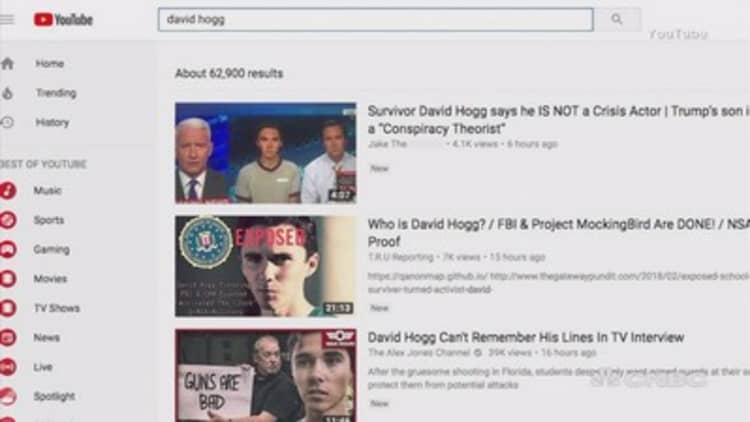A professor who studies algorithms and social networks says that YouTube's excuse for not moderating the section of its site that helps users discover new videos is "absurd."
Google-owned video site YouTube came under fire this week when a video promoting the idea that a survivor of the Florida school shooting was a crisis actor hit the No. 1 spot on its "Trending" tab in the United States. After reporters pointed it out, YouTube removed the video for violating its policy against harassment, which was updated last year to include "hoax videos that target the victims" of breaking news tragedies.
This latest blunder hit on several areas of scrutiny that YouTube is facing right now. It has previously struggled with promoting fake news after tragic events, such as last year's shooting in Las Vegas. Its algorithmic recommendations routinely promote divisive videos. This is the second high-profile incident in 2018 in which the "Trending" tab has featured inappropriate content (a now-deleted video by YouTube star Logan Paul crassly featured a suicide victim in Japan).

The Trending tab features videos algorithmically, factoring in things like view count, rate of growth in views, and the age of the video. YouTube's position is that because it has country-specific Trending tabs all over the world that update approximately every 15 minutes, it would be impossible to have humans moderate that section.
"This is an absurd excuse," Christo Wilson, an assistant professor in Northeastern University's College of Computer and Information Science, tells CNBC.
"YouTube implemented the Trending algorithm, and if it is updating too fast to moderate, then the solution is to simply slow it down. This is a technical change that is well within YouTube's control."
In the same way that YouTube makes the decision to give Trending such a high-profile spot on its home page, it can make the decision to tweak how it works.
"If Trending videos were currently being picked by a team of people, those people would be getting fired after today," Wilson says. "Why do we expect less from an algorithm?"
The risk of taking an editorial stance
YouTube CEO Susan Wojcicki has vowed that Google would increase the number of people addressing content violations to 10,000 by the end of the year. So why not change the Trending algorithm so that it could be moderated by humans, and then dedicate some of those people to the task?
Beyond the technical challenge of using humans to moderate Trending, YouTube may also want to avoid taking an editorial stance. Facebook infamously fired the humans moderating its Trending section in 2016 after accusations of political bias.
But Wilson argues that by promoting videos on Trending, YouTube already has taken a stance. YouTube creators have already been loudly criticizing the kinds of videos that Trending features, as well as its lack of transparency. This latest trip-up of the system shows how it can be used for devastating purposes, such as helping convince hundreds of thousands of people that a teenager who just experienced the worst event of his life is an actor.
"YouTube's decision to not have an editorial policy with respect to the content that trends on their homepage is itself an editorial choice," he says. "People's reaction to this latest debacle suggests that YouTube has made the wrong choice."
Another option, advocated by New York Magazine's Brian Feldon, is that the major tech platforms — YouTube, but also Twitter and Facebook — should just get rid of Trending tabs altogether.
With the recent revelations that a Russian group took advantage of social media algorithms on Facebook, Twitter and YouTube to try to divide Americans, the stakes are higher than ever.
"In an adversarial environment where the algorithm is under attack, it's YouTube's responsibility to design the system in such a way that it is resilient to this kind of manipulation, even if that means including human moderators," Wilson says.
"Can we expect perfection? Of course not. But as of today, YouTube seems to still be in the initial stages of grappling with [its] algorithmic curation issues."



